-
 Bitcoin
Bitcoin $99,468.4344
2.10% -
 Ethereum
Ethereum $2,838.8981
3.47% -
 XRP
XRP $2.7089
0.42% -
 Tether USDt
Tether USDt $1.0004
0.01% -
 BNB
BNB $666.9747
2.65% -
 Solana
Solana $180.2041
3.94% -
 USDC
USDC $1.0000
0.00% -
 Dogecoin
Dogecoin $0.2608
2.70% -
 Cardano
Cardano $0.8149
3.45% -
 TRON
TRON $0.2476
2.87% -
 Chainlink
Chainlink $19.0162
5.01% -
 Sui
Sui $3.5596
8.38% -
 Avalanche
Avalanche $26.4313
7.52% -
 Stellar
Stellar $0.3462
1.10% -
 Litecoin
Litecoin $138.8683
8.27% -
 Hedera
Hedera $0.2296
4.92% -
 Shiba Inu
Shiba Inu $0.0...01595
3.58% -
 Toncoin
Toncoin $3.6907
3.03% -
 UNUS SED LEO
UNUS SED LEO $9.7498
0.37% -
 Hyperliquid
Hyperliquid $25.4285
3.36% -
 Polkadot
Polkadot $5.3046
6.86% -
 MANTRA
MANTRA $7.5663
1.81% -
 Bitcoin Cash
Bitcoin Cash $332.9317
3.34% -
 Ethena USDe
Ethena USDe $1.0000
0.06% -
 Bitget Token
Bitget Token $4.8667
11.49% -
 Uniswap
Uniswap $9.6079
4.45% -
 Dai
Dai $1.0001
-0.02% -
 Monero
Monero $236.4426
2.66% -
 NEAR Protocol
NEAR Protocol $3.6058
9.66% -
 Pepe
Pepe $0.0...01011
7.06%
What are DeFi's anti-money laundering measures?
DeFi platforms employ various AML measures, such as decentralized exchanges, anonymity-preserving networks, smart contracts, and blockchain analysis tools, to combat money laundering.
Feb 17, 2025 at 07:19 pm
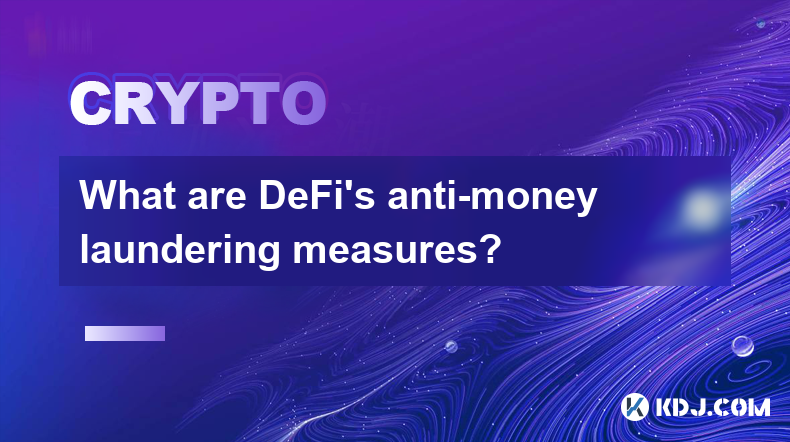
Understanding DeFi's Anti-Money Laundering Measures
Key Points:
- DeFi platforms utilize decentralized and pseudonymized transactions, posing unique challenges for AML compliance.
- Regulatory bodies are stepping up efforts to enforce AML regulations within the DeFi space.
- Various approaches and technologies are employed to combat money laundering in DeFi, including:
Decentralized AML Solutions
Decentralized Exchanges (DEXes):
- Utilize automated market makers (AMMs) to facilitate peer-to-peer trading, reducing the need for intermediaries and enhancing anonymity.
- Some DEXes implement Know-Your-Customer (KYC) protocols for identity verification, while others remain non-custodial.
- Traceability of transactions is limited on DEXes, making it more challenging to track illicit funds.
Anonymity-Preserving Networks:
- Mixing services and privacy coins, such as Monero, provide users with complete anonymity, hindering transaction tracing.
- These technologies can facilitate money laundering by obscuring the source and destination of funds.
Smart Contracts:
- Used to automate and execute transactions based on predetermined conditions.
- AML-focused smart contracts can be implemented to flag and reject suspicious transactions, enhancing visibility.
Blockchain Analysis Tools:
- Leverage advanced algorithms and data analysis techniques to assess transaction data and identify potential money laundering patterns.
- These tools can be used by regulators and law enforcement agencies to investigate illicit activities.
Regulatory Compliance in DeFi
Government Regulations:
- Various jurisdictions are developing and implementing AML frameworks specifically tailored to the DeFi sector.
- Regulations may include requirements for customer identification, transaction monitoring, and reporting of suspicious activities.
Self-Regulation:
- DeFi industry associations are working to establish best practices and self-regulatory standards to address AML concerns.
- Self-regulation can foster transparency, reduce regulatory uncertainty, and ensure compliance with AML requirements.
Know-Your-Customer (KYC) and Identity Verification
Centralized KYC Solutions:
- Certain DeFi platforms, primarily those offering custody or fiat on-ramps, implement centralized KYC procedures to identify users and comply with AML regulations.
- KYC processes involve verifying customer identification documents and collecting personal information.
Decentralized KYC Solutions:
- Emerging technologies, such as decentralized identity platforms, aim to provide AML compliance without sacrificing user anonymity.
- These solutions use cryptographic techniques to verify user identities while maintaining privacy.
Transaction Monitoring and Analysis
Transaction Monitoring:
- DeFi platforms can implement real-time transaction monitoring systems to identify suspicious activities and flag potentially illicit transactions.
- Red flags include large, inconsistent transfers, unusual patterns, and interactions with known illicit actors.
AI-Powered Analytics:
- Advanced analytics tools use artificial intelligence and machine learning algorithms to detect money laundering patterns and anomalies.
- These tools can enhance the accuracy and efficiency of transaction monitoring.
Forensic Investigations:
- Law enforcement and regulatory agencies utilize forensic analysis techniques to investigate illicit activities in DeFi.
- Forensic analysis involves examining blockchain data, identifying patterns, and tracing the flow of funds.
FAQs
Q: How effective are DeFi's anti-money laundering measures?
A: The effectiveness of DeFi's AML measures varies depending on the specific approach and implementation. Decentralized solutions offer some degree of anonymity but pose challenges for tracking illicit funds. Regulatory compliance and KYC procedures enhance transparency and compliance, while transaction monitoring and analysis provide tools to identify suspicious activities.
Q: What are the challenges in implementing AML measures in DeFi?
A: Challenges include maintaining user anonymity while ensuring compliance, balancing privacy concerns with regulatory requirements, and adapting to rapidly evolving technologies and anonymity-preserving mechanisms in the DeFi ecosystem.
Q: How can DeFi adapt to evolving money laundering techniques?
A: Continuous innovation in AML technologies and regulatory frameworks is crucial to keep pace with evolving money laundering techniques. Collaboration between DeFi platforms, regulators, and law enforcement agencies is key to addressing emerging threats and safeguarding the integrity of the DeFi ecosystem.
Disclaimer:info@kdj.com
The information provided is not trading advice. kdj.com does not assume any responsibility for any investments made based on the information provided in this article. Cryptocurrencies are highly volatile and it is highly recommended that you invest with caution after thorough research!
If you believe that the content used on this website infringes your copyright, please contact us immediately (info@kdj.com) and we will delete it promptly.
- Mutuum Finance (MUTM): A New Contender in the Crypto Market Priced Below $0.02 Is Rapidly Gaining Ground
- 2025-02-21 21:35:24
- Panshibi (SHIBI) gains momentum as the most anticipated meme coin for 2025
- 2025-02-21 21:35:24
- Can Ozak AI (OZ) Surpass Meme Coins Like Shiba Inu (SHIB) and Dogecoin (DOGE) in Profits by 2025?
- 2025-02-21 21:35:24
- American Citizens May Soon Receive a $5K 'DOGE Dividend' From the U.S. Government
- 2025-02-21 21:35:24
- PepeGPT ($PEPEAI) – The AI-Powered Meme Coin Primed to Explode 100x
- 2025-02-21 21:35:24
- Dogecoin News Spread a Significant Movement, Which Caused Strong Reactions Among Cryptocurrency Enthusiasts
- 2025-02-21 21:25:24
Related knowledge
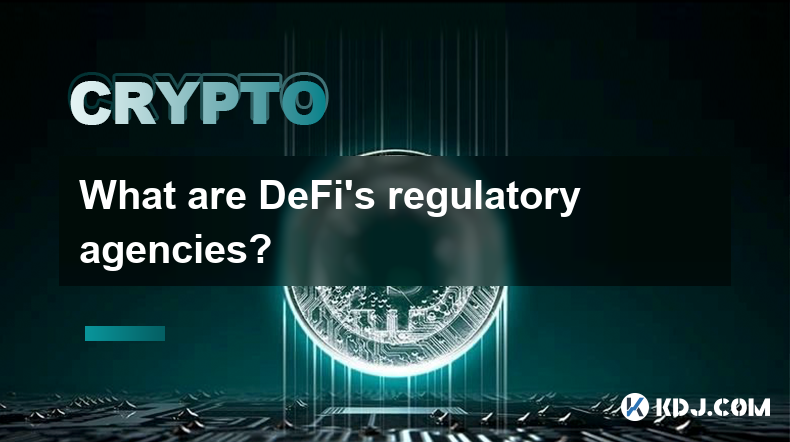
What are DeFi's regulatory agencies?
Feb 16,2025 at 05:18am
Key Points:DeFi: Definition, Architecture, and Regulatory ChallengesRole of Decentralized Autonomous Organizations (DAOs) in Self-RegulationLegal Frameworks for DeFi in the United States and European UnionInternational Cooperation and the Global DeFi Regulatory LandscapeJurisdictional Issues and Considerations for DeFi EntitiesEnforcement Actions and Li...
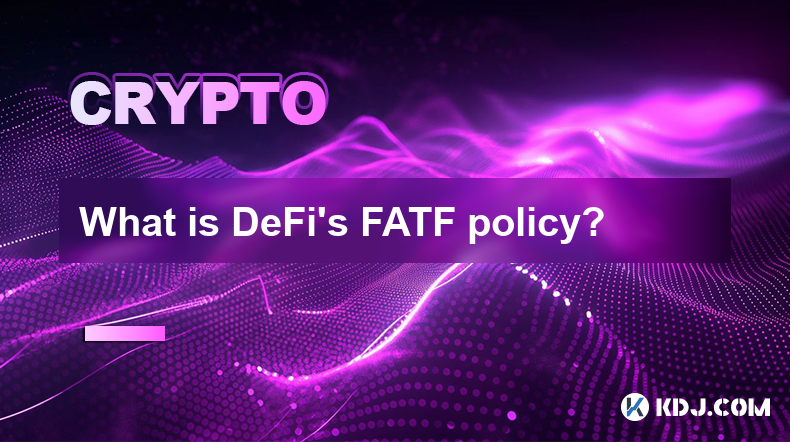
What is DeFi's FATF policy?
Feb 17,2025 at 08:06am
DeFi's FATF Policy: A Comprehensive GuideKey Points:FATF's Definition of Virtual Assets and VASPsFATF's Recommendations for DeFi PlatformsFATF's Travel Rule and its Implementation in DeFiThe Impact of FATF's Policy on DeFi AdoptionFAQs about DeFi's FATF PolicyFATF's Definition of Virtual Assets and VASPsThe Financial Action Task Force (FATF) is an inter...
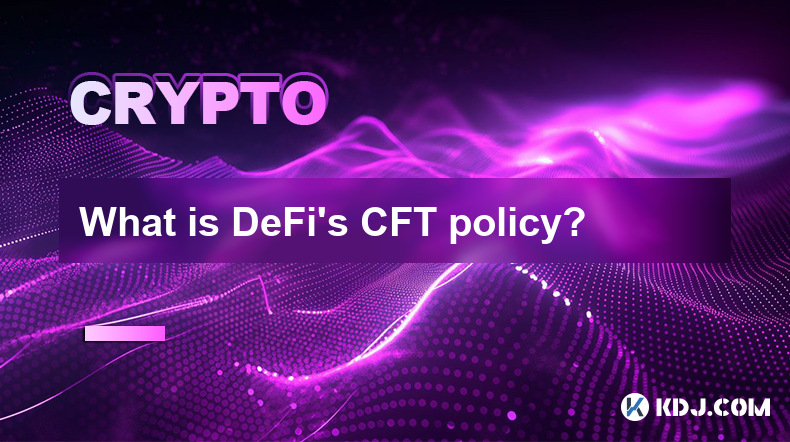
What is DeFi's CFT policy?
Feb 16,2025 at 11:54am
Key Points:Understanding CFT and its Significance in DeFiRegulatory Framework and KYC in DeFiImplementing AML/CFT Measures in DeFiProtocolsRole of Smart Contracts and Blockchain AnalysisChallenges and Future Developments in DeFi's CFT PolicyUnderstanding CFT and its Significance in DeFiCounter-Financing of Terrorism (CFT) is a crucial aspect of the cryp...
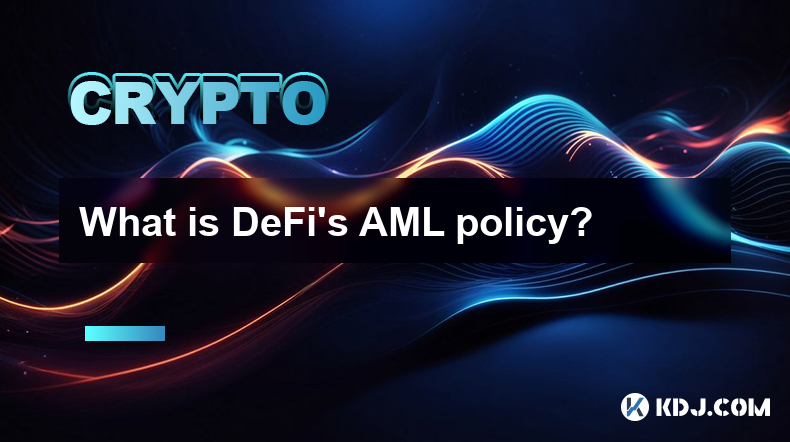
What is DeFi's AML policy?
Feb 15,2025 at 07:48pm
DeFi's AML Policy: Enhancing Compliance in the Crypto EcosystemKey Points:Understanding the Need for AML/CFT Compliance in DeFiChallenges and Limitations of DeFi AML PoliciesDecentralized Identity and Verification SolutionsSmart Contract Optimization for AML EnforcementCollaboration with Regulators and Law EnforcementUnderstanding the Need for AML/CFT C...
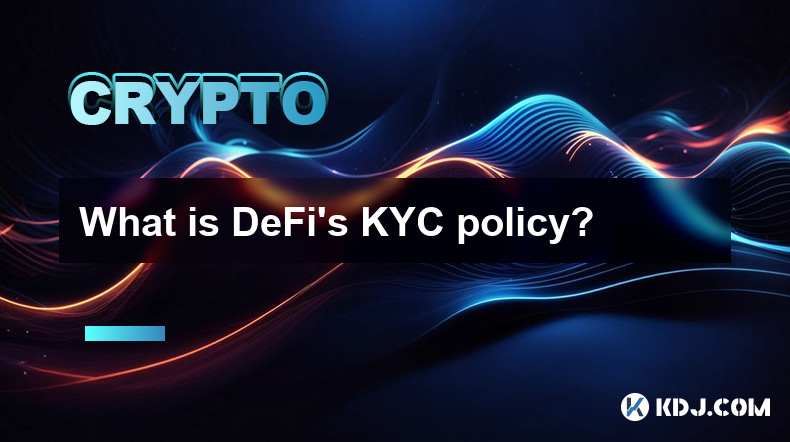
What is DeFi's KYC policy?
Feb 16,2025 at 03:51pm
Key Points:Understanding Decentralized Finance (DeFi)KYC Verification in DeFiBenefits and Drawbacks of KYC in DeFiNotable KYC-Compliant DeFi ProjectsTrends and Future of KYC in DeFiWhat is DeFi's KYC Policy?Decentralized Finance (DeFi) refers to a transformative financial ecosystem that operates on decentralized blockchain networks. Unlike traditional f...

What are DeFi's anti-money laundering measures?
Feb 17,2025 at 07:19pm
Understanding DeFi's Anti-Money Laundering MeasuresKey Points:DeFi platforms utilize decentralized and pseudonymized transactions, posing unique challenges for AML compliance.Regulatory bodies are stepping up efforts to enforce AML regulations within the DeFi space.Various approaches and technologies are employed to combat money laundering in DeFi, incl...

What are DeFi's regulatory agencies?
Feb 16,2025 at 05:18am
Key Points:DeFi: Definition, Architecture, and Regulatory ChallengesRole of Decentralized Autonomous Organizations (DAOs) in Self-RegulationLegal Frameworks for DeFi in the United States and European UnionInternational Cooperation and the Global DeFi Regulatory LandscapeJurisdictional Issues and Considerations for DeFi EntitiesEnforcement Actions and Li...

What is DeFi's FATF policy?
Feb 17,2025 at 08:06am
DeFi's FATF Policy: A Comprehensive GuideKey Points:FATF's Definition of Virtual Assets and VASPsFATF's Recommendations for DeFi PlatformsFATF's Travel Rule and its Implementation in DeFiThe Impact of FATF's Policy on DeFi AdoptionFAQs about DeFi's FATF PolicyFATF's Definition of Virtual Assets and VASPsThe Financial Action Task Force (FATF) is an inter...

What is DeFi's CFT policy?
Feb 16,2025 at 11:54am
Key Points:Understanding CFT and its Significance in DeFiRegulatory Framework and KYC in DeFiImplementing AML/CFT Measures in DeFiProtocolsRole of Smart Contracts and Blockchain AnalysisChallenges and Future Developments in DeFi's CFT PolicyUnderstanding CFT and its Significance in DeFiCounter-Financing of Terrorism (CFT) is a crucial aspect of the cryp...

What is DeFi's AML policy?
Feb 15,2025 at 07:48pm
DeFi's AML Policy: Enhancing Compliance in the Crypto EcosystemKey Points:Understanding the Need for AML/CFT Compliance in DeFiChallenges and Limitations of DeFi AML PoliciesDecentralized Identity and Verification SolutionsSmart Contract Optimization for AML EnforcementCollaboration with Regulators and Law EnforcementUnderstanding the Need for AML/CFT C...

What is DeFi's KYC policy?
Feb 16,2025 at 03:51pm
Key Points:Understanding Decentralized Finance (DeFi)KYC Verification in DeFiBenefits and Drawbacks of KYC in DeFiNotable KYC-Compliant DeFi ProjectsTrends and Future of KYC in DeFiWhat is DeFi's KYC Policy?Decentralized Finance (DeFi) refers to a transformative financial ecosystem that operates on decentralized blockchain networks. Unlike traditional f...

What are DeFi's anti-money laundering measures?
Feb 17,2025 at 07:19pm
Understanding DeFi's Anti-Money Laundering MeasuresKey Points:DeFi platforms utilize decentralized and pseudonymized transactions, posing unique challenges for AML compliance.Regulatory bodies are stepping up efforts to enforce AML regulations within the DeFi space.Various approaches and technologies are employed to combat money laundering in DeFi, incl...
See all articles





















































































